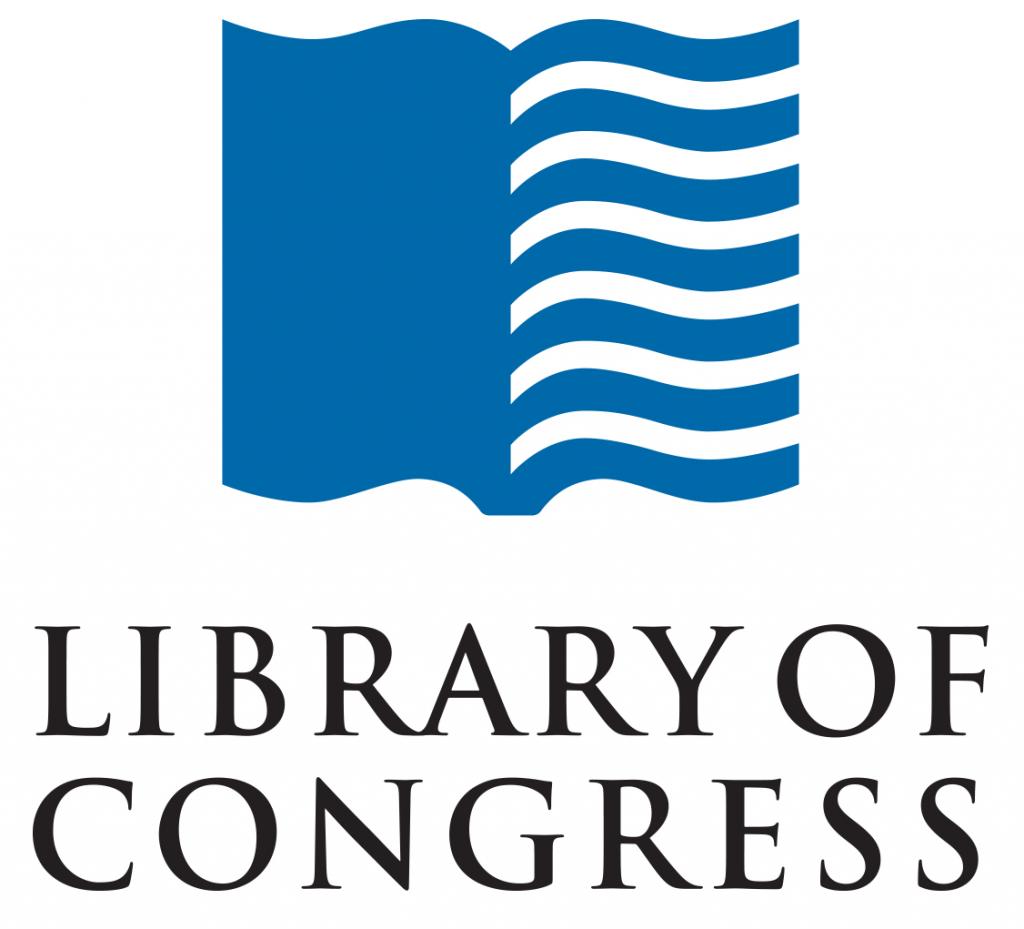Items in Remembering Lincoln that are transcribed.
from Mar. 2, 1867
"LINCOLN"
-
Full Title
"LINCOLN": San Antonio Express
-
Description
This article, published by the San Antonio Express on March 2, 1867, contains an interview with William Herndon's law partner. Herndon spoke of Lincoln's romantic ventures in his earlier years. Following the interview, a beautiful description of the grave of Lincoln is provided.
-
Transcription
LINCOLN
A special correspondent of the New York Tribune, writing from Springfield, Ill., relates the following episode in the life of Mr. Lincoln. Mr. Herndon was Mr. Lincoln's law partner. The correspondent says:
"The tenderness of Mr. Lincoln nature romance in early manhood, and as of this Mr. Herndon had spoken in public, I asked particularly about it.
At Sangamon, Illinois, a pretty and high-spirited girl, without fortune, made havoc in many hearts and Mr. Lincoln constituted one of three earnest suitors who wanted her in marriage. She preferred the address of a young merchant of the town, and gave the other two their conge. Her affianced soon afterwards went East to buy goods, but as he returned was taken with brain fever in some wayside town, and lay raving for three months, unknown by name or residence to his entertainers. A rumor started that he had run away to avoid marrying his lady, and waiting some time in vain to hear from him, she received anew the attentions of Mr. Lincoln. About the time when they passed from courtesy to tenderness, and marriage between them was more than hinted at, the sick man returned like a ghost, gauged the condition of affairs, and upbraided the lady with fickleness. She had a delicate sense of honor, and felt keenly the shame of having seemed to trifle with two gentlemen at once; this preyed upon her mind til her body, not very strong, suffered by sympathy, and Mr. Herndon has oral and written testimony that the girl died out of regret at the equivocal position she had unwillingly assumed. The names of all the parties he has given me, but I do not care to print them."
The same writer gives the following beautifully description of the spot where lies all that is mortal of the lamented savior of our country:
"I know of no better illustration of the difference between the real life and the renown of Mr. Lincoln than you get by visiting his grave. A horse railroad, two miles long, leads to it, in the cemetery of Oak Ridge. Behind you is his real life, Springfield, a Western market town, set upon the monotonous prairie, half the year noisy with the chatter of politicians, plethoric with lawyers, for all of whom there is less than enough to do, and savoring much of the frost and the frontier; a pretty prairie city, but capitalized so that what the State has not done for the town, and the people expected it to do, make an unfinished desultoryness. – All at once, as you approach the Sangamon river, the scene changes. Stalwart young oaks of natural growth become plentiful. The landscape is plowed with leafy ravines. Bold knowls start up. – A creek goes plashing around the abrupt hills. Shadow, murmur, and surprise succeed the level life of the city. And among all these mysteries, itself the great mystery of our age, the vault of the President caps a hill, a temporary edifice of brick, and the great drive of one of the handsomest cemeteries in the Union winds with the winding brook beneath it:
"The last
As 'twere the cape of a long ridge of hills,"
and all the white tombs martial it; buttonwood, maple and ash trees cluster at its base; here is to be his monument. – About $75,000 have been collected for it up to this time, and it is supposed the State will vote enough to make $200,000 in all. There is no sweeter spot for a tired life to rest in. It would be blasphemy to mar the dead man's grave with any mere prettiness of marble or smartness of bronze. Let the firey, untamed Western genius be of timid chisel here: "Abraham Lincoln" is a good epitaph if plainly lettered. And, after all, will any monument be like the man, for no such one was ever a sculptur's theme before. Canova could get no notion of Mr. Lincoln. An allegory would be unlike him, a shaft too formal, a statue too inexpressive. If the Pacific railroad could be called by his name, that would be better."
[Transcription by Deborah Taylor.] -
Source
Newsbank
-
Rights
This item is in the public domain and may be reproduced and used for any purpose, including research, teaching, private study, publication, broadcast or commercial use, with proper citation and attribution.
-
Tags
-
Cite this Item
San Antonio Express. ""LINCOLN": San Antonio Express". San Antonio Express. Remembering Lincoln. Web. Accessed December 13, 2025. https://rememberinglincoln.fords.org/node/1103
from Mar. 2, 1867
"LINCOLN": San Antonio Express

-
Description
This article, published by the San Antonio Express on March 2, 1867, contains an interview with William Herndon's law partner. Herndon spoke of Lincoln's romantic ventures in his earlier years. Following the interview, a beautiful description of the grave of Lincoln is provided.
-
Source
Newsbank
-
Rights
This item is in the public domain and may be reproduced and used for any purpose, including research, teaching, private study, publication, broadcast or commercial use, with proper citation and attribution.
-
Creator
San Antonio Express
-
Publisher
San Antonio Express
-
Date
March 2, 1867
-
Material
newspaper
from Feb. 14, 1866
Regarding the Death of Abraham Lincoln, Arizona Miner
-
Full Title
Regarding the Death of Abraham Lincoln, Arizona Miner
-
Description
The Arizona House of Representatives, President of the Council and the Assistant Secretary of the Arizona Territory signed a resolution as a formal expression of regret for the death of President Abraham Lincoln in February 1866. This article is an official recording of the opinion of the people of Arizona almost a year after the event. A copy of the resolution was sent to President Lincoln's family and was published in the Arizona Miner newspaper as well as other journals of the Pacific and Atlantic States. Originally established as a Republican newspaper in 1864 by Territorial Secretary Richard McCormick (nominated by President Lincoln in 1863), the publication grew to become very politically partisan when racist Democrat John H. Marion took over as editor in 1867. Arizona became a state in 1912.
-
Transcription
Regarding the death of Abraham Lincoln.
WHEREAS, There has been, to this time, no formal expression of regret on the part of the people of Arizona over the untimely and lamentable death of Abraham Lincoln, the sixteenth President of the United States; therefore
Resolved, By the House of Representatives, the Council concurring, That we record our abhorrence of the dastardly act which deprived the nation of the valuable life of Abraham Lincoln, when his great statesmanship and noble character had won the confidence and applause of the civilized world, and the wisdom of his administration of public affairs, at the most critical period in the life of the American people, was universally conceded.
Resolved, That here where civil law was first established by the generous consideration of his administration, as elsewhere upon the continent, which owes so much to his honest and persistent devotion to liberty to justice and to the government of the people, his name is honored and revered as that of a true patriot, a profound ruler, and a magnanimous and unselfish man, whose highest motive was the public good, and whose consistent career has elevated the dignity, brightened the renown, and enriched the history of the Republic.
Resolved, That a copy of these resolutions be forwarded to the family of the illustrious dead, and to the present President of the United States, also that they be published in the ARIZONA MINER, and in the principal journals of the Pacific and Atlantic States.
JAMES S. GILES,
Speaker of the House of Representatives.
HENRY A. BIGELOW,
President of the Council.
A true copy of the original on file in my office.
HENRY W. FLEURY,
Assistant Secretary of the Territory.
[Transcription by: Ricarda H., Dr. Susan Corbesero’s Class, Ellis School, Pittsburgh, Pennsylvania] -
Source
Library of Congress Chronicling America
-
Rights
This item is in the public domain and may be reproduced and used for any purpose, including research, teaching, private study, publication, broadcast or commercial use, with proper citation and attribution.
-
Tags
-
Cite this Item
Fort Whipple Arizona Miner. "Regarding the Death of Abraham Lincoln, Arizona Miner". Tisdale A. Hand. Remembering Lincoln. Web. Accessed December 13, 2025. https://rememberinglincoln.fords.org/node/1096
-
Creator
Fort Whipple Arizona Miner
-
Publisher
Tisdale A. Hand
-
Date
February 14, 1866
from Feb. 14, 1866
Regarding the Death of Abraham Lincoln, Arizona Miner

-
Description
The Arizona House of Representatives, President of the Council and the Assistant Secretary of the Arizona Territory signed a resolution as a formal expression of regret for the death of President Abraham Lincoln in February 1866. This article is an official recording of the opinion of the people of Arizona almost a year after the event. A copy of the resolution was sent to President Lincoln's family and was published in the Arizona Miner newspaper as well as other journals of the Pacific and Atlantic States. Originally established as a Republican newspaper in 1864 by Territorial Secretary Richard McCormick (nominated by President Lincoln in 1863), the publication grew to become very politically partisan when racist Democrat John H. Marion took over as editor in 1867. Arizona became a state in 1912.
-
Source
Library of Congress Chronicling America
-
Rights
This item is in the public domain and may be reproduced and used for any purpose, including research, teaching, private study, publication, broadcast or commercial use, with proper citation and attribution.
-
Creator
Fort Whipple Arizona Miner
-
Publisher
Tisdale A. Hand
-
Date
February 14, 1866
from Apr. 20, 1865
Letter from William H. Kesler, 3rd Missouri Cavalry
-
Full Title
Letter from William H. Kesler, 3rd Missouri Cavalry, to his sister Rose Ann Kesler
-
Description
A letter from William H. Kesler to his sister Rose Ann Kesler in late April 1865. He writes to her about hearing of the assassination, his sorrow and anger toward the assassin. At the beginning of the Civil War, William H. Kesler resided in Champaign, Illinois but joined the Missouri volunteer units after the quota was reached in his home state. He served in the 3rd Missouri Calvary from January 1862 - June 1865. He joined Company D, which was captained by John H. Reed and composed of men from both Missouri and Illinois. As part of a Union cavalry brigade, the 3rd Missouri Cavalry marched into Arkansas in August 1863, and was part of the force which captured the state capital at Little Rock on September 10th of that year. He spent much of the rest of the war in the Little Rock area and returned home in June of 1865.
-
Transcription
Little Rock Ark April 20th 1865
Dear Sister I seat my self this morn for the purpose of penning you a few lines to let you know that I am in good health and hope those few lines may find you in the same enjoyment. I received yours of the 10th a short time since and was happy to hear from you and learn that you were all in good health. I should like to have been to the Supper given by the good Templers for I know they must have had a fine Supper and a pleasant time. I think you would have been fixed if I had been home the day you had so many visiters but I expect that I would have spoiled the enjoyment of the rest of the party with my (gass). I am glad to hear that you will not open my package of letters that I sent home by Mrs Reed. But tell Mother not to be to sure a bout them being from the girls. And that I will read a few of them to her when I come home. But can not promise to read them all as it would take up to much time and then would not be interesting to her. The joy of the troops here was turned in to sorrow on receiving the news of the assassination of the President. I felt that day a though I could shoot any body that was a rebel. Oh how I should love to have the fun of putting the man to death that Killed the President. My feelings were such that I could have cut him up in inch peaces. But never mind the soldiers of the North will avenge his death with a thousand lives. I want to see this war closed now. For the feelings of the Soldiers now toward the south is not very friendly sure. I Expressed $100.00 One Hundred Dollars home a few days a go by parkers Express. I have nothing of importance to write so I will close hoping to hear from you soon. I remain as ever your Affectionate Brother Will
P.S. please Write soon And excuse mistakes Will
I am going to send you a painting of the hospital at Little Rock. Which I want you to Keep clean and nice untill I come home. Will -
Source
The State Historical Society of Missouri
-
Rights
This item is in the public domain and may be reproduced and used for any purpose, including research, teaching, private study, publication, broadcast or commercial use, with proper citation and attribution.
-
Tags
-
Cite this Item
William H. Kesler. "Letter from William H. Kesler, 3rd Missouri Cavalry, to his sister Rose Ann Kesler". The State Historical Society of Missouri. Remembering Lincoln. Web. Accessed December 13, 2025. https://rememberinglincoln.fords.org/node/1094
-
Creator
William H. Kesler
-
Publisher
The State Historical Society of Missouri
-
Date
April 20, 1865
from Apr. 20, 1865
Letter from William H. Kesler, 3rd Missouri Cavalry, to his sister Rose Ann Kesler
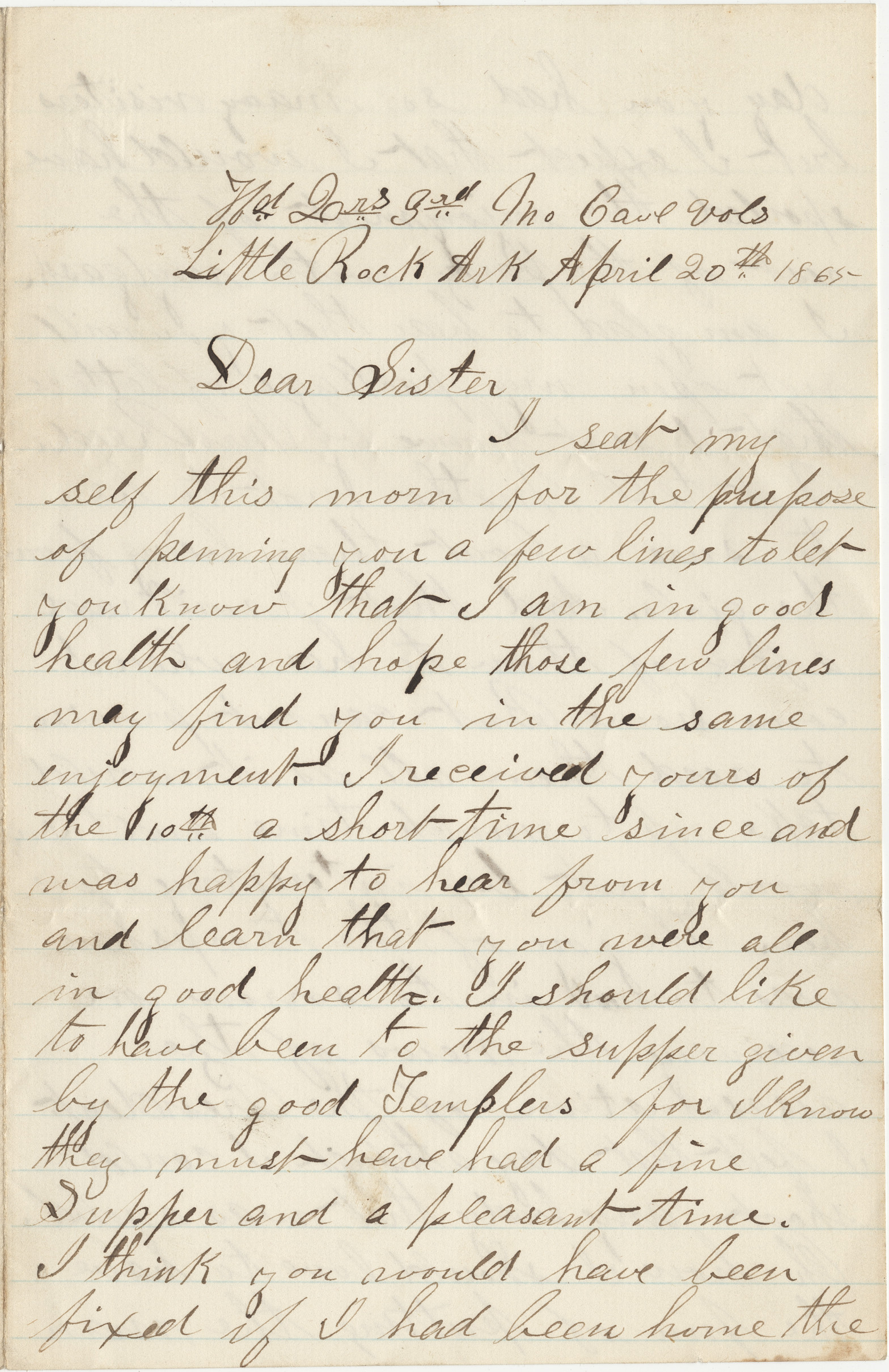
-
Description
A letter from William H. Kesler to his sister Rose Ann Kesler in late April 1865. He writes to her about hearing of the assassination, his sorrow and anger toward the assassin. At the beginning of the Civil War, William H. Kesler resided in Champaign, Illinois but joined the Missouri volunteer units after the quota was reached in his home state. He served in the 3rd Missouri Calvary from January 1862 - June 1865. He joined Company D, which was captained by John H. Reed and composed of men from both Missouri and Illinois. As part of a Union cavalry brigade, the 3rd Missouri Cavalry marched into Arkansas in August 1863, and was part of the force which captured the state capital at Little Rock on September 10th of that year. He spent much of the rest of the war in the Little Rock area and returned home in June of 1865.
-
Source
The State Historical Society of Missouri
-
Rights
This item is in the public domain and may be reproduced and used for any purpose, including research, teaching, private study, publication, broadcast or commercial use, with proper citation and attribution.
-
Creator
William H. Kesler
-
Publisher
The State Historical Society of Missouri
-
Date
April 20, 1865
from Jan. 1, 1929
"Long, Long Ago" by Clara Clough Lenroot
-
Full Title
"Long, Long Ago" - Memoir of Clara Clough Lenroot, Childhood in Wisconsin
-
Description
Born in 1857, Clara Clough Lenroot was less than 10 years old when President Lincoln was assassinated. This excerpt, from her memoir "Long, Long Ago" published in 1929, highlights her family's reaction to the news as they were moving to their new home in the wilderness outside of Osceola Mills, Wisconsin. Her father, Solon H. Clough, was a lawyer from Fulton, New York who hoped to find fortune out West in the early 1860s. Later in life, Clara married Irvine Lenroot who served in the U.S. House of Representatives from 1909 to 1918 and in the U.S. Senate from 1918 to 1927. Throughout the 1930s their daughter Katharine fought to regulate child labor laws and successfully lobbied for the Fair Labor Standards Act of 1938, which also established a national minimum wage. Katharine also served as third Chief of the United States Children's Bureau.
-
Transcription
In April of that year we moved over to our own farm, about a mile away, and about two miles away from the village of Osceola. I recall one interesting incident of the day on which we took possession of the farm. It was April, 1865. We were driving to our new home. Arriving at a little brook, father drove the horse into the stream to water him. As we waited a man came along on horseback, drew rein on the bridge, and beckoned to father. He drove through the stream, got out of the buggy and approached the man, who spoke a few words to him in a low, earnest voice. Father uttered an exclamation of dismay, and came back and told Mother the astounding news that Lincoln had been assassinated! So was that tremendous news transmitted to us, undoubtedly two or three days after its occurrence, as we had no telegraphic communication. The dreadful news permeated slowly by some such means as it came to us to the remotest parts of the country.
We rode on in silence. We little girls sensed the fact that calamity had overtaken our world. We were hushed by the sorrow in our parents’ faces, and asked no questions. In sad silence we approached the farmhouse that was to be our home, an event which we had anticipated with tremendous excitement and curiosity. Arrived at the little home, father and mother made some pretence of arranging the household goods, but mother soon seated herself upon a bench outside the kitchen door, and tears ran down her face. Father came and sat beside her, wiping his own eyes, and took her hand in his. We children stood around, more and more impressed by their grief. Little was done towards settling the new home that day.
(In sharp contrast to the slow progress of the news of Lincoln’s assassination came the news of President Harding’s death in 1923 to a rural camp in the midst of the pine forest. There a radio set had been installed. Mrs. Claude Luse, alone in her camp near Gordon, Wisconsin, children and maid in bed, was listening to a fine concert being radioed from the Drake Hotel in Chicago. A singer had just begun a solo. She had sung but a few words when the music stopped and a voice said, “We have just had word that President Harding died in San Francisco ten minutes ago; stand by for confirmation.” In a few seconds the statement was confirmed. Mrs. Luse’s neighbor, Mr. Gallaher, starting to town early the next morning, carried the news with him along the route.)
[Transcription by: Kyra S., Dr. Susan Corbesero’s Class, Ellis School, Pittsburgh, Pennsylvania] -
Source
Library of Congress, General Collections and Rare Book and Special Collections Division
-
Rights
The written permission of the copyright owners and/or other rights holders (such as publicity and/or privacy rights) is required for distribution, reproduction, or other use of protected items beyond that allowed by fair use or other statutory exemptions.
-
Tags
-
Cite this Item
Clara Clough Lenroot. ""Long, Long Ago" - Memoir of Clara Clough Lenroot, Childhood in Wisconsin". Badger Printing Company. Remembering Lincoln. Web. Accessed December 13, 2025. https://rememberinglincoln.fords.org/node/1092
-
Creator
Clara Clough Lenroot
-
Publisher
Badger Printing Company
-
Date
1929
-
Dimensions
24 cm.
from Jan. 1, 1929
"Long, Long Ago" - Memoir of Clara Clough Lenroot, Childhood in Wisconsin
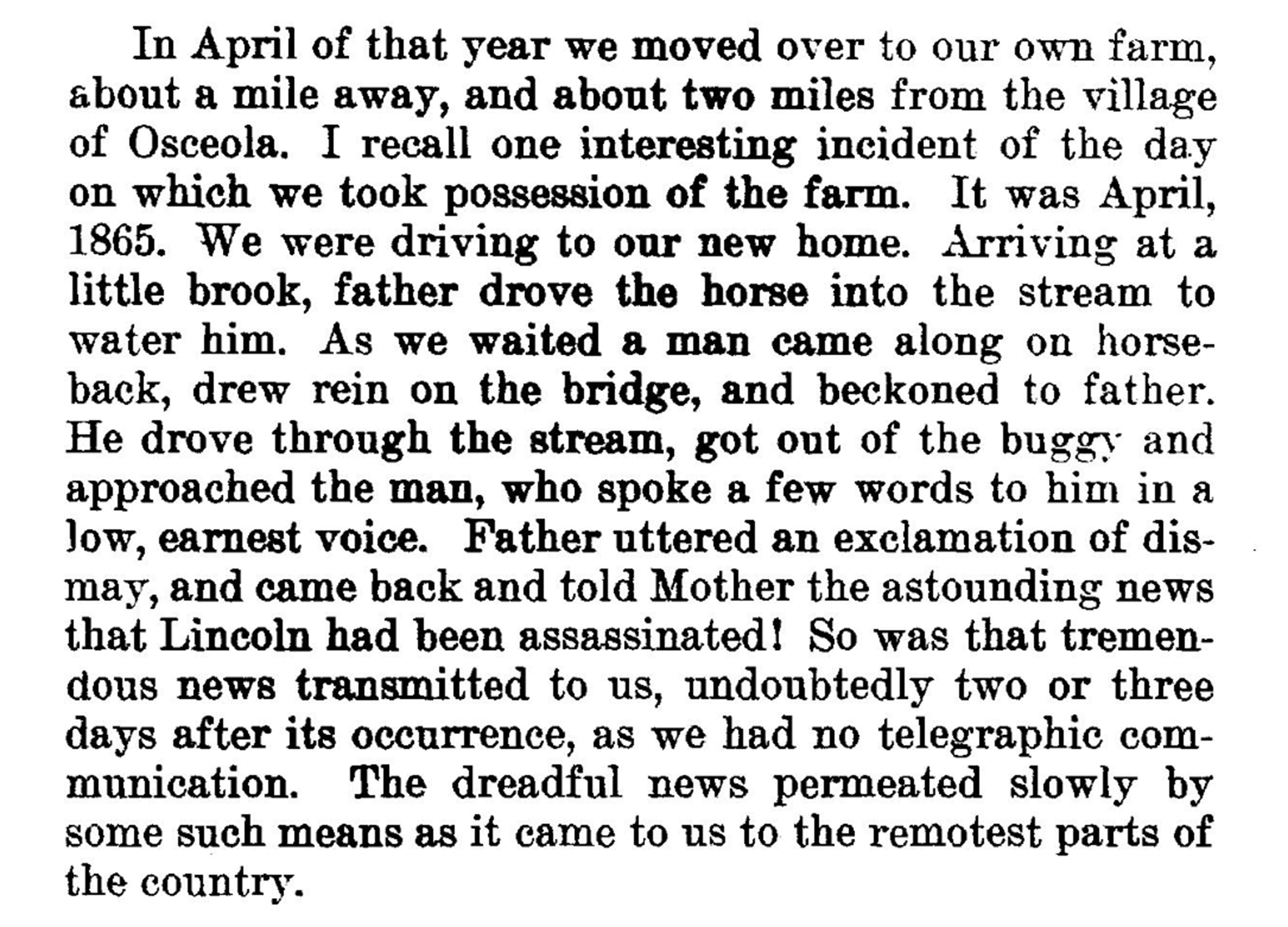
-
Description
Born in 1857, Clara Clough Lenroot was less than 10 years old when President Lincoln was assassinated. This excerpt, from her memoir "Long, Long Ago" published in 1929, highlights her family's reaction to the news as they were moving to their new home in the wilderness outside of Osceola Mills, Wisconsin. Her father, Solon H. Clough, was a lawyer from Fulton, New York who hoped to find fortune out West in the early 1860s. Later in life, Clara married Irvine Lenroot who served in the U.S. House of Representatives from 1909 to 1918 and in the U.S. Senate from 1918 to 1927. Throughout the 1930s their daughter Katharine fought to regulate child labor laws and successfully lobbied for the Fair Labor Standards Act of 1938, which also established a national minimum wage. Katharine also served as third Chief of the United States Children's Bureau.
-
Source
Library of Congress, General Collections and Rare Book and Special Collections Division
-
Rights
The written permission of the copyright owners and/or other rights holders (such as publicity and/or privacy rights) is required for distribution, reproduction, or other use of protected items beyond that allowed by fair use or other statutory exemptions.
-
Creator
Clara Clough Lenroot
-
Publisher
Badger Printing Company
-
Date
January 1, 1929
-
Dimensions
24 cm.
from Apr. 28, 1865
Lincoln Assassination, April 28th, 1865
-
Full Title
El Nuevo Mundo: Lincoln Assassination, April 28th, 1865
-
Description
El Nuevo Mundo [The New World], was a Spanish tri-weekly newspaper dedicated to the interest of Republicanism in the Americas; copies were circulated throughout California, Mexico, Central America, and South America. In this issue, the newspaper included an illustration and an account from an eyewitness of the assassination of Lincoln in the Ford Theatre. Taking place two weeks after the assassination, El Nuevo Mundo reporters attended a Mexican Patriotic Club meeting in Virginia, Nevada. The President of the club gave a speech, expressing a thirst for justice and the fall of the Confederacy. The Society of Patriotic Women of Virginia City was also in attendance at the meeting in junction with the men of the Mexican Patriotic Club, whose president also gave a speech in front of the entire body. In a slightly altered manner, she spoke of not merely a hopeful defeat of the Confederates, but of return to union.
-
Transcription
“The Lady Harris, who was in the box with the president, gives the following account: The assassin entered in the box, and Major Rathburn [Henry Rathbone] got up and asked the intruder what business had him there. Without answering he ran inside, and placed the gun to the head of the president, fired, and in that instant he jumped onto the balustrade of the box and made a threatening motion with a dagger he carried, pointed at the face or chest of Mr. Lincoln… Major Rathburn [Rathbone] jumped forward to protect the president, grabbed the assassin by the end of his frock and was stabbed in the arm. The assassin then jumped onto the stage and fled – Dispatch of the associated press”
-
Source
Newsbank
-
Rights
Use of this item for research, teaching, and private study is permitted with proper citation and attribution. Reproduction of this item for publication, broadcast, or commercial use requires written permission.
-
Tags
-
Cite this Item
El Nuevo Mundo. "El Nuevo Mundo: Lincoln Assassination, April 28th, 1865 ". El Nuevo Mundo. Remembering Lincoln. Web. Accessed December 13, 2025. https://rememberinglincoln.fords.org/node/1090
from Apr. 28, 1865
El Nuevo Mundo: Lincoln Assassination, April 28th, 1865
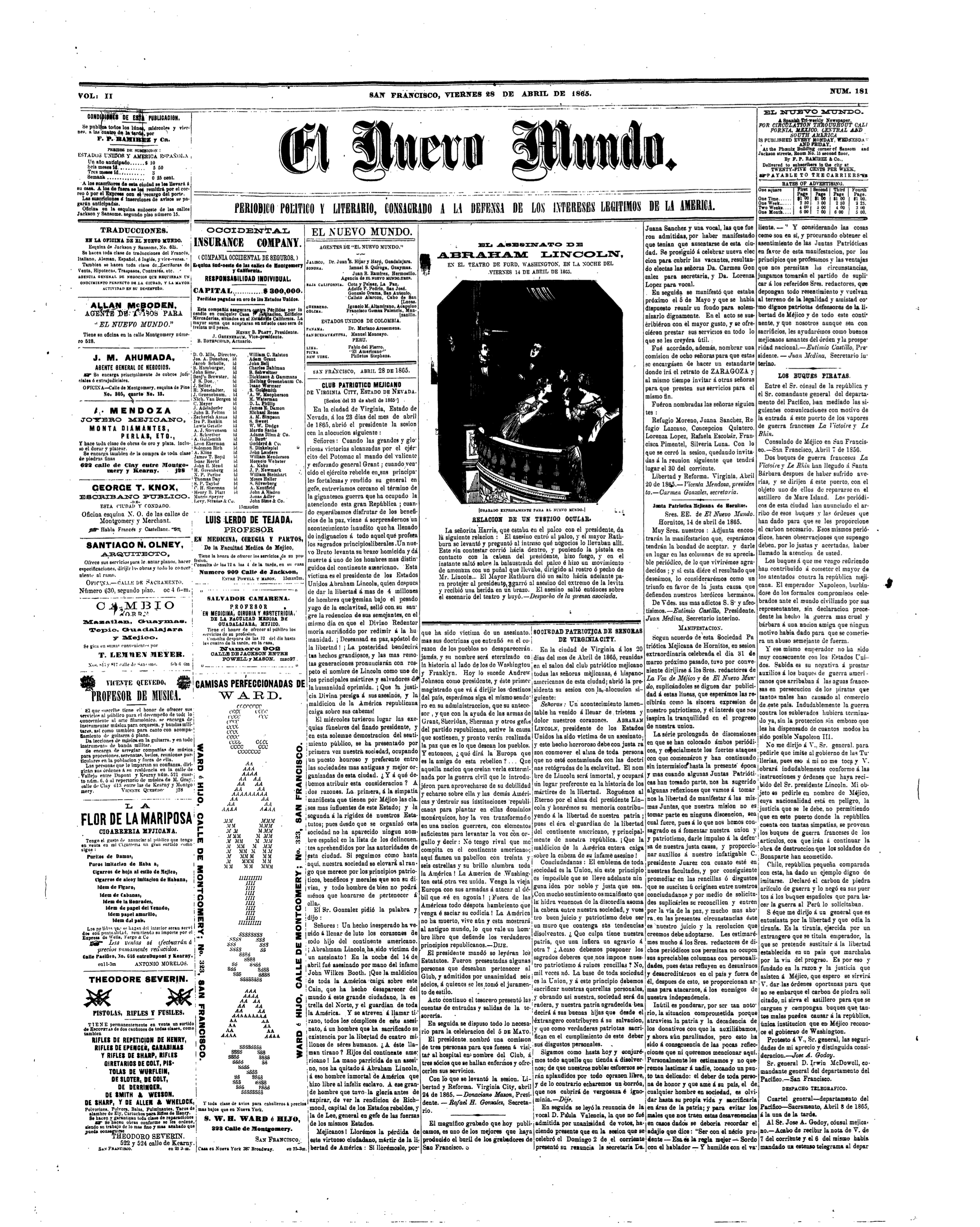
-
Description
El Nuevo Mundo [The New World], was a Spanish tri-weekly newspaper dedicated to the interest of Republicanism in the Americas; copies were circulated throughout California, Mexico, Central America, and South America. In this issue, the newspaper included an illustration and an account from an eyewitness of the assassination of Lincoln in the Ford Theatre. Taking place two weeks after the assassination, El Nuevo Mundo reporters attended a Mexican Patriotic Club meeting in Virginia, Nevada. The President of the club gave a speech, expressing a thirst for justice and the fall of the Confederacy. The Society of Patriotic Women of Virginia City was also in attendance at the meeting in junction with the men of the Mexican Patriotic Club, whose president also gave a speech in front of the entire body. In a slightly altered manner, she spoke of not merely a hopeful defeat of the Confederates, but of return to union.
-
Source
Newsbank
-
Rights
Use of this item for research, teaching, and private study is permitted with proper citation and attribution. Reproduction of this item for publication, broadcast, or commercial use requires written permission.
-
Creator
El Nuevo Mundo
-
Publisher
El Nuevo Mundo
-
Date
April 28, 1865
-
Material
newspaper
from Jan. 31, 1866
Joseph S. Caulk to Andrew Johnson and Edwin M. Stanton
-
Full Title
Joseph S. Caulk to Andrew Johnson and Edwin M. Stanton
-
Description
Joseph S. Caulk, a veteran of Company K of the 24th Regiment of the U.S. Colored Infantry, wrote to President Andrew Johnson and Secretary of War Edwin Stanton seeking permission to march while armed to honor the deceased President Abraham Lincoln's birthday in 1866. Caulk, a bricklayer from Delaware, enlisted in the U.S. Army at age 44 on March 28, 1865, shortly before the surrender of Confederate General Robert E. Lee.
-
Transcription
Wilmington Jan 31th 1866
Sir
Mr President or Secatary of Ware by Permishin i take the liberty to ask you to be so kind as to gave us the Returnd Soldears of the State of Delawear a permit to turn under armes on the 12th of Februeary to Silabrat of our Well belovid Mr Aberham Lincoln birth day our opposers has Sead the collard pepel Wor going to rase but person With comon Sence Wold know better yours With respect Write to
Joseph S. Caulk W. 7. St No 214
Wilmington, Del– -
Source
Shared by Jonathan White, associate professor of American Studies at Christopher Newport University. Joseph S. Caulk to Andrew Johnson and Edwin M. Stanton, January 31, 1866, in RG 107 (Records of the Office of the Secretary of War), microfilm M494 (Letters Received by the Secretary of War From the President, Executive Departments, and War Department Bureaus, 1862-1870), reel 84.
-
Rights
This item is in the public domain may be reproduced and used for any purpose, including research, teaching, private study, publication, broadcast or commercial use, with proper citation and attribution.
-
Tags
-
Cite this Item
Joseph S. Caulk. "Joseph S. Caulk to Andrew Johnson and Edwin M. Stanton". Remembering Lincoln. Web. Accessed December 13, 2025. https://rememberinglincoln.fords.org/node/1087
-
Creator
Joseph S. Caulk
-
Date
January 31, 1866
from Jan. 31, 1866
Joseph S. Caulk to Andrew Johnson and Edwin M. Stanton
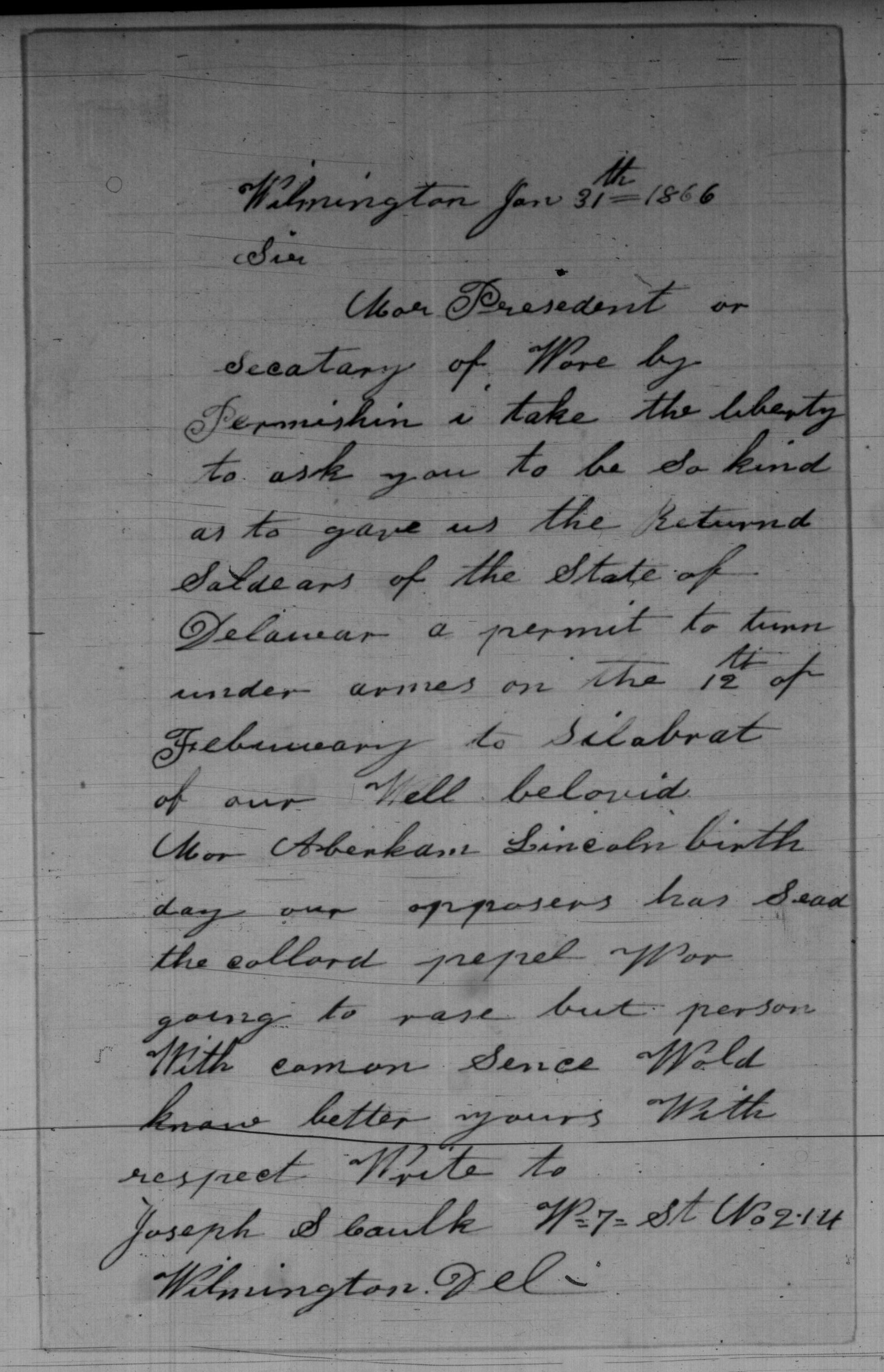
-
Description
Joseph S. Caulk, a veteran of Company K of the 24th Regiment of the U.S. Colored Infantry, wrote to President Andrew Johnson and Secretary of War Edwin Stanton seeking permission to march while armed to honor the deceased President Abraham Lincoln's birthday in 1866. Caulk, a bricklayer from Delaware, enlisted in the U.S. Army at age 44 on March 28, 1865, shortly before the surrender of Confederate General Robert E. Lee.
-
Source
Shared by Jonathan White, associate professor of American Studies at Christopher Newport University. Joseph S. Caulk to Andrew Johnson and Edwin M. Stanton, January 31, 1866, in RG 107 (Records of the Office of the Secretary of War), microfilm M494 (Letters Received by the Secretary of War From the President, Executive Departments, and War Department Bureaus, 1862-1870), reel 84.
-
Rights
This item is in the public domain may be reproduced and used for any purpose, including research, teaching, private study, publication, broadcast or commercial use, with proper citation and attribution.
-
Creator
Joseph S. Caulk
-
Date
January 31, 1866
from Apr. 23, 1865
Patriotic Club of Mexico
-
Full Title
Patriotic Club of Mexico
-
Description
On April 23, 1865, the Patriotic Club of Mexico called a special meeting of it's members in the mining town of Virginia City, Nevada. Latinos across the West who had supported Lincoln and the Union cause were shocked, and they gathered to reflect on the assassination and it's international impact. Meetings were often organized around "juntas patrioticas", patriotic assemblies of Latinos formed in the aftermath of the 1862 French invasion of Mexico. This is an excerpt from a speech given by Rafael H. Gonzalez, a member of the club, who shares his lament for the assassination of Abraham Lincoln and uncertainty about the nation's future.
-
Transcription
Mr. Gonzalez requested the floor and said:
Gentlemen: An unexpected event has come to fill with grief the hearts of every son of America. Abraham Lincoln has become a victim of assassination! On the night of April 14, he was assassinated by the hand of the villainous John Wilkes Booth. May the curse of all the Americas fall on this Cain for this evil of taking from the world this great citizen, the Northern Star, and the guardian angel of all the Americas. To dare call tyrants, all the accomplices of this assassination, of a man who sacrificed his existence for the liberty of 4 million human beings. Do you call this tyranny? Sons of America! The parricidal hand of an assassin has taken Abraham Lincoln, that immortal man of America who freed the miserable slaves. That great man had the glory, before he expired, to see the surrender of Richmond, capital of the Rebel states, and Lee, general of those forces.
Mexicans! Let us cry for the loss of this virtuous citizen, martyr for the liberty of America. Let us cry because he has become the victim of an assassin. His teachings engraved upon the hearts of the people shall never disappear, and his name shall eternally live in history alongside Washington and Franklin. Now succeeded by Andrew Johnson as president, and this first magistrate that will direct the destiny of this country, we hope he follows the same path with his administration that his predecessor, and with the help of Grant, Sheridan, Sherman, and other members of the Republican party, mobilize the movement they uphold, and soon they will realize the peace the people desire.
-
Rights
TY - NEWS N1 - Provider: NewsBank/Readex, Database: America's Historical Newspapers, SQN: 11ED162540E86FE8 TI - Club Patriotico Mejicano De Virginia City, Estado De Nevada PY - 1865/04/28 JF - Voz del Nuevo Mundo JA - El Nuevo Mundo SP - 1 CP - San Francisco, California ER -
-
Tags
-
Cite this Item
Club Patriotico Mejicano. "Patriotic Club of Mexico". Voz del Nuevo Mundo. Remembering Lincoln. Web. Accessed December 13, 2025. https://rememberinglincoln.fords.org/node/1086
from Apr. 23, 1865
Patriotic Club of Mexico

-
Description
On April 23, 1865, the Patriotic Club of Mexico called a special meeting of it's members in the mining town of Virginia City, Nevada. Latinos across the West who had supported Lincoln and the Union cause were shocked, and they gathered to reflect on the assassination and it's international impact. Meetings were often organized around "juntas patrioticas", patriotic assemblies of Latinos formed in the aftermath of the 1862 French invasion of Mexico. This is an excerpt from a speech given by Rafael H. Gonzalez, a member of the club, who shares his lament for the assassination of Abraham Lincoln and uncertainty about the nation's future.
-
Rights
TY - NEWS N1 - Provider: NewsBank/Readex, Database: America's Historical Newspapers, SQN: 11ED162540E86FE8 TI - Club Patriotico Mejicano De Virginia City, Estado De Nevada PY - 1865/04/28 JF - Voz del Nuevo Mundo JA - El Nuevo Mundo SP - 1 CP - San Francisco, California ER -
-
Creator
Club Patriotico Mejicano
-
Publisher
Voz del Nuevo Mundo
-
Date
April 23, 1865
from Apr. 15, 1865
Letter to Mother
-
Full Title
Letter from John T. Ford to his Mother
-
Description
John T. Ford, owner of Ford's Theatre, wrote a letter to his mother, in Richmond, Va., the day of President Abraham Lincoln's death, apparently unaware of the news that the president had been murdered in his theatre. Ford expresses gratitude for his wife's health and the growth of his children. Coincidentally, he states that his daughter's birthday is April 15, and that his birthday is April 16. After hearing of the assassination, Ford took a train to Baltimore and was then arrested, questioned about the attack and imprisoned for a month. Ford denied any involvement in the conspiracy despite the fact that he had been a friend of John Wilkes Booth. Ownership of the theatre returned to Ford after the investigation and he attempted to reopen for performances. Many threatened to burn the theatre down and Ford eventually sold the building to the federal government. He continued to own and operate theatres in Maryland, Pennsylvania, South Carolina and Virginia.
-
Transcription
Dear Mother
I came to Richmond
hoping to see you and Frances - I
was glad to learn that she had
gone to Baltimore - I go home
Monday morning
I left all well, Edith has been in
bad health for nearly one year
but she is now quite well.
We have our six children, Annie
is taller than her mother - Charlie
is a very bright handsome boy nearly
13 years old. He is studying hard
and a fine scholar. George is
my [?] he is next to Charlie and
a dear good boy. Lizzie and Fannie
are two of the prettiest and sweetest
little girls in Baltimore.
John Lee is the youngest. He
is Martha's boy. He [masters?] her
everyway, and she has spoiled
him completely. She says Johnnie
is the prettiest
Martha is well and happy only
like Edith anxious about
you. They send their love
to all. Lucy-Jane, [?]
their brother and all
I Send you twenty dollars for
yourself and twenty dollars for
Jane as I fear she wants it. Send
it to her
Mrs. Stark has kindly promised to
send this. When I write again
I will direct to her care
Let me hear from you soon direct
to the enclosed direction - use
the envelope withing this letter and
have it put in the Richmond Postoffice
with the love of all, I am
affectionately yours
J. T. Ford
Richmond Va April 15th 1865
Today is Saturday Annie's birthday fifteen
years old. Tomorrow I am 36. -
Source
Box 4, John Thompson Ford Papers, Manuscript Division, Library of Congress, Washington, D.C.
-
Rights
This item is in the public domain and may be reproduced and used for any purpose, including research, teaching, private study, publication, broadcast or commercial use, with proper citation and attribution.
-
Tags
-
Cite this Item
John T. Ford. "Letter from John T. Ford to his Mother". Remembering Lincoln. Web. Accessed December 13, 2025. https://rememberinglincoln.fords.org/node/1078
-
Creator
John T. Ford
-
Date
April 15, 1865
from Apr. 15, 1865
Letter from John T. Ford to his Mother
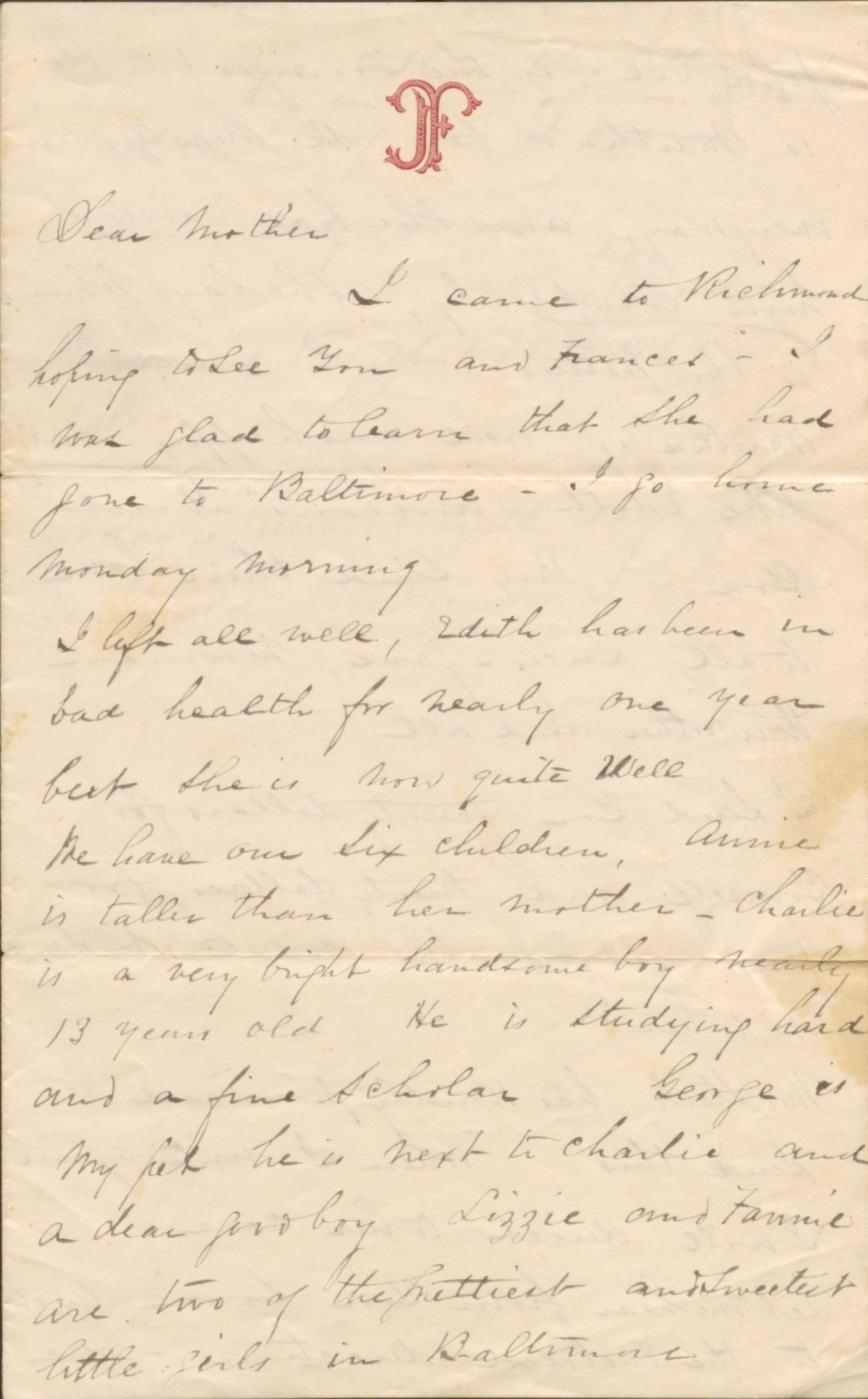
-
Description
John T. Ford, owner of Ford's Theatre, wrote a letter to his mother, in Richmond, Va., the day of President Abraham Lincoln's death, apparently unaware of the news that the president had been murdered in his theatre. Ford expresses gratitude for his wife's health and the growth of his children. Coincidentally, he states that his daughter's birthday is April 15, and that his birthday is April 16. After hearing of the assassination, Ford took a train to Baltimore and was then arrested, questioned about the attack and imprisoned for a month. Ford denied any involvement in the conspiracy despite the fact that he had been a friend of John Wilkes Booth. Ownership of the theatre returned to Ford after the investigation and he attempted to reopen for performances. Many threatened to burn the theatre down and Ford eventually sold the building to the federal government. He continued to own and operate theatres in Maryland, Pennsylvania, South Carolina and Virginia.
-
Source
Box 4, John Thompson Ford Papers, Manuscript Division, Library of Congress, Washington, D.C.
-
Rights
This item is in the public domain and may be reproduced and used for any purpose, including research, teaching, private study, publication, broadcast or commercial use, with proper citation and attribution.
-
Creator
John T. Ford
-
Date
April 15, 1865
from Apr. 14, 1865
Silas H. Billings Diary
-
Full Title
Silas H. Billings Diary
-
Description
Silas H. Billings was a U.S. Army soldier from Lafayette, New York, wounded at the Battle of Winchester in September 1864. In April 1865 he was a patient at Saterlee Hospital in Philadelphia, Pennsylvania, when he learned that John Wilkes Booth had assassinated President Abraham Lincoln. Billings then received permission to attend Lincoln's funeral in Philadelphia. Like many people at the time, Billings recorded both newsworthy events, like Lincoln's assassination, and the details of his everyday life together. After the Civil War, Billings became a school teacher and part-time farmhand. His wounds led to his death in 1873, at the age of only 30.
-
Transcription
[inside cover]
Silas H. Billings
Wounded at
Winchester Va
Sept 19 1864
[Friday, April 14, 1865]
Abraham Lincoln
is Shot at Fords
Theatre at 9,30 p m and dies at 722 am
Wm H & Fred Seward are stabbed at or
about the same time
[Saturday, April 15, 1865]
my eye is very bad
[Wednesday, April 19, 1865]
Funeral of our Chief
Abraham Lincoln
President of the
U S of America
Recd a Visit from
C F Falch co. "D" 9 ny
Ward 2 Turners Lane
[Saturday, April, 22, 1865]
Recd a pass 2 pm to 9 pm
went downtown to Corner
of Broad & Prime Sts
Funeral Train of the
late President A Lincoln
arrives at 4,30 pm
Procession is formed in
Broad & goes down to
Walnut up to 21st
down to Vine down to
2nd up to Chesnut to
Independence Hall on
Chesnut between 5th & 6th
-
Source
Marjorie Billings Martinez, great-granddaughter of Silas H. Billings
-
Rights
This item may be reproduced and used for any purpose, including research, teaching, private study, publication, broadcast or commercial use, with proper citation and attribution.
-
Tags
-
Cite this Item
Silas H. Billings. "Silas H. Billings Diary". Remembering Lincoln. Web. Accessed December 13, 2025. https://rememberinglincoln.fords.org/node/1040
-
Creator
Silas H. Billings
-
Date
April 14, 1865
from Apr. 14, 1865
Silas H. Billings Diary
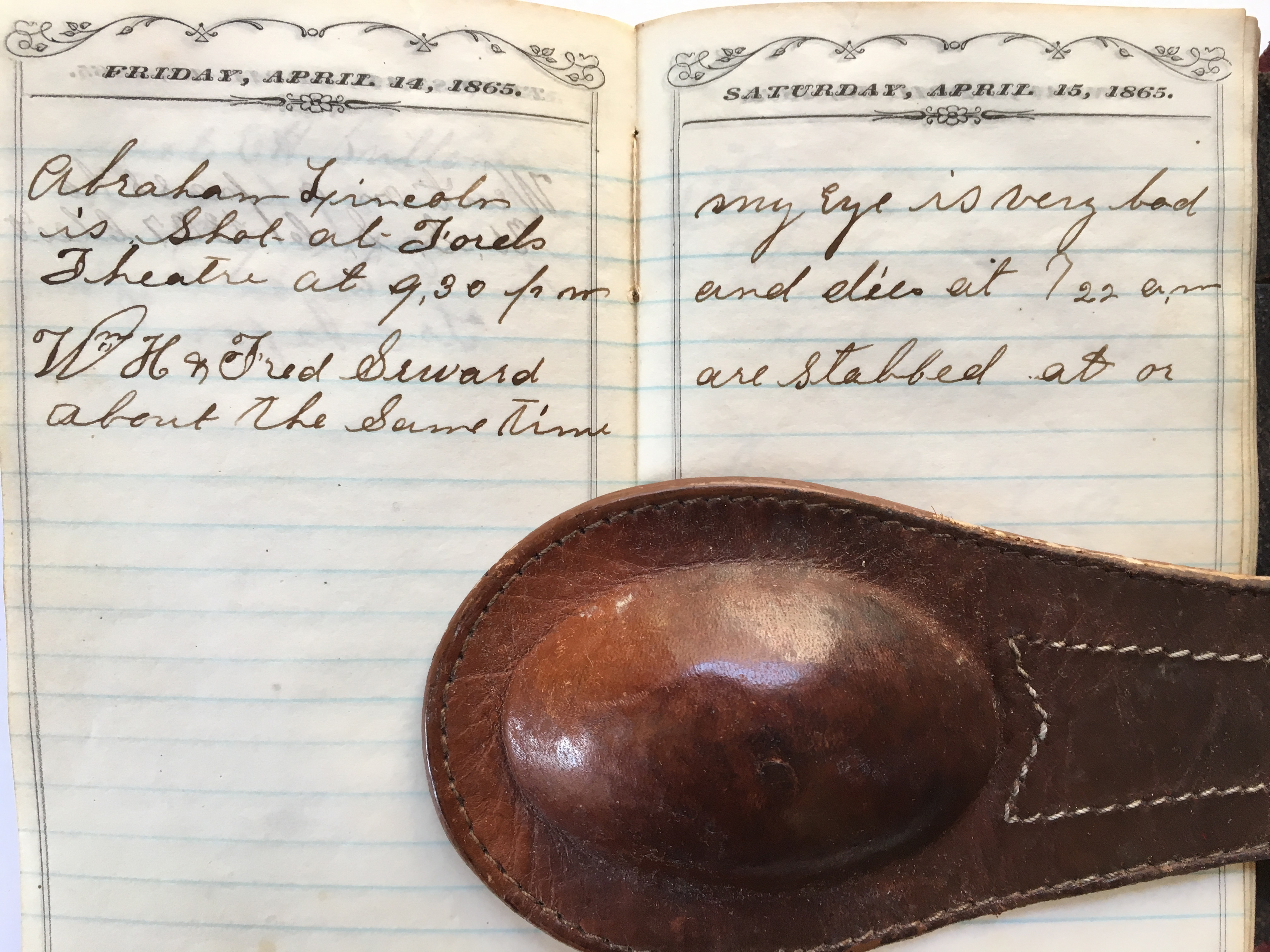
-
Description
Silas H. Billings was a U.S. Army soldier from Lafayette, New York, wounded at the Battle of Winchester in September 1864. In April 1865 he was a patient at Saterlee Hospital in Philadelphia, Pennsylvania, when he learned that John Wilkes Booth had assassinated President Abraham Lincoln. Billings then received permission to attend Lincoln's funeral in Philadelphia. Like many people at the time, Billings recorded both newsworthy events, like Lincoln's assassination, and the details of his everyday life together. After the Civil War, Billings became a school teacher and part-time farmhand. His wounds led to his death in 1873, at the age of only 30.
-
Source
Marjorie Billings Martinez, great-granddaughter of Silas H. Billings
-
Rights
This item may be reproduced and used for any purpose, including research, teaching, private study, publication, broadcast or commercial use, with proper citation and attribution.
-
Creator
Silas H. Billings
-
Date
April 14, 1865
from May. 1, 1865
The President's grave
-
Full Title
The President's grave
-
Description
Work for vocal quartet and piano associated with the Union side. Part of the Library of Congress Civil War Sheet Music Collection.
-
Transcription
Verse 1
Be silent! there cometh on spirit wings sped,
The wail of a nation in grief for the dead;
The strong and the mighty, from glory and light,
Hath waned in his brightness and left us in night;
The proud eagle banners all droopingly wave,
And the wild wings are hushed round the President's grave.
And the wild winds are hushed round the President's grave.
Verse 2
A deep brooding sorrow comes over the heart
A moan like the tempest, when summers depart,
A gushing of anguish, unbroken and still,
As tolleth the requiem o'er valley and hill;
The sun that rose bright o'er the free and the brave
Now is setting in gloom o'er the President's grave.
Now is setting in gloom o'er the President's grave.
Verse 3
Be silent! our father hath laid him to rest,
A hero of battles hath yielded his crest,
A statesman hath fallen, his counsels are o'er,
His firmness and wisdom shall guide us no more:
Let cannon boom forth and the banners all wave,
While we mingle our tears o'er the President's grave.
While we mingle our tears o'er the President's grave.
-
Source
-
Rights
Public Domain. Suggested credit line: Civil War Sheet Music Collection, Library of Congress, Music Division.
-
Tags
-
Cite this Item
Miller, L. B. (composer); Babbitt, Edwin S. (lyricist). "The President's grave". Chicago: Root & Cady, 1865. Remembering Lincoln. Web. Accessed December 13, 2025. https://rememberinglincoln.fords.org/node/1035
from May. 1, 1865
The President's grave

-
Description
Work for vocal quartet and piano associated with the Union side. Part of the Library of Congress Civil War Sheet Music Collection.
-
Source
-
Rights
Public Domain. Suggested credit line: Civil War Sheet Music Collection, Library of Congress, Music Division.
-
Creator
Miller, L. B. (composer); Babbitt, Edwin S. (lyricist)
-
Publisher
Chicago: Root & Cady, 1865
-
Date
May 1, 1865
-
Material
Sheet Music

